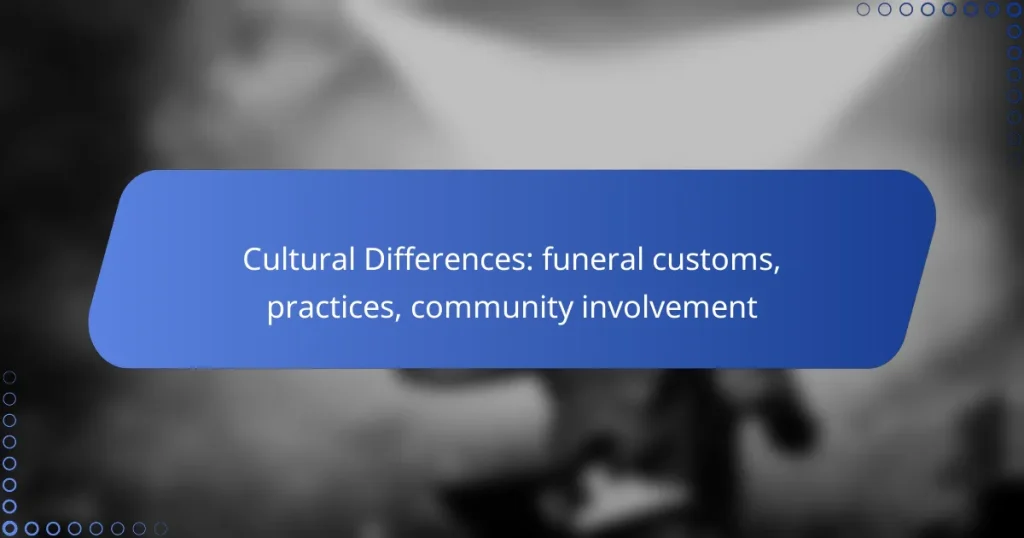Funeral customs around the world showcase a rich tapestry of cultural beliefs and practices that shape how communities honor the deceased and support the grieving. These rituals not only reflect diverse perspectives on life and death but also highlight the importance of community involvement in the mourning process. By engaging family and friends, these practices foster a sense of belonging and shared healing during times of loss.

What are common funeral customs in Canada?
In Canada, funeral customs vary widely across different cultures and regions, but they generally emphasize respect for the deceased and support for the grieving family. Common practices include traditional burials, cremation, memorial services, and community involvement, reflecting the diverse beliefs and values of Canadian society.
Traditional burial practices
Traditional burial practices in Canada often involve a service at a funeral home or place of worship, followed by interment in a cemetery. Families typically choose a casket that reflects their loved one’s personality, and it is common to include personal items or mementos in the burial. The burial site may be marked with a headstone, which can include inscriptions and symbols significant to the deceased.
In many cases, the burial is accompanied by a procession where family and friends gather to pay their respects. This communal aspect helps support those grieving and fosters a sense of closure.
Cremation trends
Cremation is increasingly popular in Canada, with many families opting for it due to its lower cost and flexibility. Approximately 70% of Canadians choose cremation over traditional burial, reflecting changing attitudes toward death and memorialization. Cremated remains can be kept in an urn, scattered in a meaningful location, or incorporated into memorial jewelry.
When selecting cremation, families often hold a service beforehand, allowing for a final farewell. This can be customized to align with the deceased’s wishes, whether through a formal ceremony or a more casual gathering.
Memorial services
Memorial services in Canada can take place weeks or even months after the death, allowing families to gather at a time that suits them. These services often focus on celebrating the life of the deceased, featuring speeches, music, and personal stories. They can be held in various venues, including homes, community centers, or places of worship.
Families may choose to incorporate unique elements, such as photo displays or video tributes, to personalize the experience. This flexibility enables families to create a meaningful tribute that resonates with the deceased’s legacy.
Role of religious beliefs
Religious beliefs significantly influence funeral customs in Canada, with various faiths having distinct practices. For example, Christian funerals typically include a service that emphasizes hope and resurrection, while Jewish funerals often involve a quick burial and a period of mourning called shiva.
Many Canadians also incorporate spiritual elements into their services, regardless of organized religion. This may include readings, prayers, or rituals that reflect personal beliefs, allowing families to honor their loved ones in a way that feels authentic to them.
Community gatherings
Community involvement plays a vital role in Canadian funeral customs, as friends and neighbors often come together to support grieving families. This can take the form of meal deliveries, organizing memorial events, or simply offering companionship during difficult times.
In some cultures, community gatherings may include specific rituals or practices, such as sharing stories or participating in a group prayer. These acts of solidarity help strengthen social bonds and provide emotional support to those in mourning.

How do funeral customs differ across cultures?
Funeral customs vary significantly across cultures, reflecting diverse beliefs about life, death, and the afterlife. These practices can influence how communities mourn, honor the deceased, and involve family and friends in the grieving process.
Indigenous practices
Indigenous cultures often have unique funeral customs that emphasize a deep connection to the land and ancestors. For example, some tribes may conduct ceremonies that involve storytelling, singing, and rituals to honor the deceased’s spirit and ensure a safe passage to the afterlife.
Community involvement is crucial in these practices, as members gather to support the grieving family and participate in rituals that can last several days. Traditional foods and offerings may also be part of the ceremonies, reinforcing communal bonds.
Asian cultural influences
Asian cultures exhibit a rich tapestry of funeral customs, often influenced by religious beliefs such as Buddhism, Hinduism, and Confucianism. In many cases, rituals focus on honoring ancestors and ensuring their spirits are at peace. For instance, in Chinese culture, families may burn incense and joss paper as offerings during the mourning period.
Community involvement is significant, with extended family and friends participating in rituals that may last from a few days to several weeks. The use of specific colors, such as white in Chinese funerals, also reflects cultural attitudes toward death and mourning.
European traditions
European funeral customs vary widely, influenced by historical, religious, and regional factors. In many Western cultures, funerals are often formal events held in churches or funeral homes, where eulogies are delivered, and hymns are sung. In contrast, some Eastern European traditions may include elaborate rituals and communal gatherings to celebrate the deceased’s life.
Community involvement can range from attending the funeral service to participating in post-funeral gatherings, such as wakes. Customs like the use of flowers or specific attire, such as black clothing, are common across many European cultures, symbolizing mourning and respect.
African heritage
African funeral customs are diverse, reflecting the continent’s rich cultural heritage. Many communities emphasize the celebration of life, with vibrant ceremonies that include music, dance, and storytelling. For instance, in some West African cultures, funerals can be grand events that last several days, involving the entire community.
Community participation is essential, as it reinforces social ties and collective mourning. Rituals may include the sharing of food, traditional attire, and symbolic acts that honor the deceased and support the grieving family. Understanding these customs is vital for respectful engagement in African communities.

What is the role of community in funeral practices?
The community plays a vital role in funeral practices by providing emotional and logistical support to grieving families. Community involvement fosters a sense of belonging and shared mourning, which can be crucial for healing during such a difficult time.
Community support systems
Community support systems often include family, friends, and local organizations that come together to assist bereaved families. These systems can provide practical help, such as meal preparation, childcare, or financial assistance, easing the burden during a challenging period. In many cultures, this collective support is seen as a fundamental aspect of honoring the deceased.
Volunteer organizations
Volunteer organizations frequently step in to help with funeral arrangements and services, offering their resources and manpower. These groups may assist with tasks like organizing memorial services, providing transportation, or even helping with burial arrangements. Engaging with local volunteer organizations can significantly alleviate stress for grieving families.
Local memorial events
Local memorial events serve as a communal way to honor the deceased and allow community members to express their condolences. These events can range from formal services to informal gatherings, often including shared stories, music, and rituals that reflect the cultural background of the deceased. Participating in or organizing such events can strengthen community ties and provide a supportive environment for healing.

How to choose a funeral service provider?
Choosing a funeral service provider involves evaluating their offerings, reputation, and pricing to ensure they align with your needs and values. It’s essential to consider local customs and regulations while making this decision.
Factors to consider
When selecting a funeral service provider, consider their experience, the range of services offered, and their understanding of cultural practices. Look for providers who are familiar with local customs, as this can significantly impact the service’s relevance and comfort for attendees.
Additionally, assess their facilities and staff professionalism. A welcoming environment and compassionate staff can enhance the experience during a difficult time.
Comparing local providers
Start by gathering a list of local funeral service providers through online searches, community recommendations, or directories. Compare their services, such as traditional funerals, cremations, and memorial services, to find the best fit for your needs.
Visit their websites or contact them directly to inquire about their offerings and any special packages. Personal visits can also help you gauge the atmosphere and staff responsiveness.
Pricing transparency
Pricing transparency is crucial when choosing a funeral service provider. Request a detailed price list that outlines all services and potential additional costs, such as transportation or memorial items.
Many providers are required to disclose their prices upfront, but it’s wise to ask about any hidden fees. Comparing prices among different providers can help you find a service that fits your budget while still meeting your expectations.

What are the legal requirements for funerals in Canada?
In Canada, legal requirements for funerals include the registration of death, obtaining necessary permits, and adhering to regulations regarding burial or cremation. These processes ensure that funerals comply with local laws and respect the deceased’s wishes.
Death registration process
The death registration process in Canada involves notifying the appropriate government authority, typically within a few days of the death. A funeral director usually assists families in completing the necessary paperwork, which includes a medical certificate of death and a registration form.
Once the documents are submitted, the vital statistics office issues a death certificate, which is essential for settling the deceased’s estate and handling other legal matters. Families should ensure they have multiple copies of the death certificate for various administrative needs.
Burial permits
In Canada, a burial permit is required before interring a body in a cemetery. This permit is usually obtained by the funeral director and must be submitted to the cemetery prior to the burial. It confirms that the death has been legally registered and that the burial complies with local regulations.
It’s important to check with the specific cemetery for any additional requirements they may have, such as plot reservations or fees. Families should also be aware that some provinces may have specific regulations regarding the location and depth of graves.
Cremation regulations
Cremation in Canada is regulated at the provincial level, with each province having its own set of rules. Generally, a cremation permit must be obtained, which involves submitting the death certificate and a completed application to the crematorium.
Many provinces require a waiting period of 24 to 48 hours after death before cremation can take place, allowing for any necessary legal or family considerations. Families should consult with their chosen crematorium to understand specific regulations and options available for memorial services following cremation.


